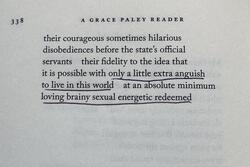Ultra-Orthodox photoshop of horrors: Round 2
Images courtesy ofFailedMessiah.com.
In May, the Hasidic Jewish newspaper, Der Tzitung, made a lot of people angry by photoshopping Hillary Clinton out of a photo in the name of tzniut, or modesty. Within days, the incident spawned a fabulous internet meme where people photoshopped women out of iconic images. The point that photoshop should not be used to erase or alter women in images as to rewrite history or reality was made ... or so we thought.
Yesterday, Failed Messiah and Heeb Magazine reported on a new photoshop disaster. Jewpiter, a kiruv (ultra-Orthodox Jewish missionary or outreach) organization geared to college students, photoshopped a stock image photo of a young woman to make her breasts and butt smaller and add a black three-quarter length shirt under her summer dress. (See image top right)
Failed Messiah goes into depth discussing Jewpiter's mission, describing the organization's methods as "deceptive" and "unethical." I do not know enough about the organization to speak to this fact, but their use of photoshop in this case is pretty deceptive and unethical.
Considering the ubiquitous sexualization of women in the media, I can imagine that it might be difficult to find stock image photos of young women that fit the standards of tzniut. So, even though I don't love the idea, I can understand altering a model's wardrobe with photoshop to make it more modest. What I can't understand or condone is altering a model's body.
Why did Jewpiter feel it necessary to bring this model down to an AA cup? Why did they feel it necessary to amputate her butt? The only possible thing to deduce from this is that they don't feel that womanly curves are "modest"--that the simple act of having breasts and a rear end is "too suggestive." This, of course, is a terrible message to send to young women, especially considering the fact that Jewish women are known for being stereotypically full-figured. Ultimately the effect of all this photoshopping is to make the model look thinner, which brings up a whole slew of body image issues for Jewish women. Let us not forget that eating disorders are a big problem in the Orthodox community.
Frankly, this use of photoshop is deplorable and says some really troubling things about ultra-Orthodox attitudes towards women and women's bodies. It also speaks to the audacity of the community to rewrite reality in order to make it fit within their worldview. Newsflash: Women are going to continue to have breasts and butts no matter how many stock images you alter. You're not fooling anybody.








Ms. Berkenwald, I appreciate your response, and I respectfully disagree with almost all of it. It's unfortunate that your staunch support for womens' rights isn't accompanied by a respect for others. You have maligned my organization, done so publicly so that many others will see that attack, and have yet to apologize. If you had simply emailed Partners in Torah first with the curious question: "Dude, what's with the photo-shop on the girl?", none of this would have occurred. It is this I would suggest that is behind the comment above regarding your journalistic failure; even as a blogger with attitude, you have a responsibility not to wrongly accuse people. Let me be clear: for you to assume we acted unethically, and then fail to even bother to ask us before leveling your broadside, is patently unethical on your part; not only that, but in my view it reduces your credibility and brings you further from your goal of advancing the causes you champion. That you couch your actions in the guise of reason ... "the only possible thing to deduce ..." and make wholly unwarranted speculations ... "this use of photoshop is deplorable and says some really troubling things about ultra-Orthodox attitudes towards women and women's bodies." -- only makes the whole thing worse. If your aspiration were to facilitate a thoughtful discussion, then you might have come back and fleshed out truthfully what this use of photoshop says about the attitudes of the "ultra-orthodox" toward women. As noted earlier, we acted to ensure the J of our logo would not juxtapose the model's breast in a way that objectively looked to be lewd. This use of photoshop therefore says a great deal about how the orthodox view women's bodies -- with profound respect! The truth of the matter is the opposite of your deduction. What would a real dialogue on this photoshop have looked like. Hmm, isn't it curious that there exists a worldview out there that rather than exploit the model's obvious physical beauty to appeal to a college aged crowd, chose instead to ensure she not be objectified as a piece of physicality? Yes, but you reduced her bust; isn't that disrespectful and negating her beauty?!! Great question -- you are right, but at what point does a woman's image cross over to becoming objectified? How do you define that point precisely in the context of a marketing effort? Even more, how does the concept of physical beauty fit within a world of spiritual pursuits? This is a discussion. Nope, none of that on this post. Won't find those difficult questions raised here. Only attacks with attitude. How easy it is to malign a world you do not understand rather than be curious, assume the good, and benefit from the perspective of others. Be well, Yaacov
Please forgive my late response; I wanted to give it some thought before responding.
Yaacov, thank you for your explanation about why the modelÌ¢âÂã¢s body was altered. I do apologize for making assumptions about the motivations behind the act. I really appreciate your response and knowing this was done for design reasons does make me feel a little better about it. That being said, I never referred to you or your organization as Ì¢âÂÒevil people.Ì¢âÂå
Ultimately, I donÌ¢âÂã¢t think itÌ¢âÂã¢s unreasonable to make the kind of assumption that I did considering the amount of unethical photoshopping that goes today. (Like the Ann Taylor model whoÌ¢âÂã¢s waist was photoshopped to be thinner than her head)
I do think itÌ¢âÂã¢s important for marketers, advertisers and graphic designers to consider what in the health communication biz is referred to as the Ì¢âÂÒunintended consequencesÌ¢âÂå of their work. Even though the intentions in this case may have been about good design, the unintended consequences are that young women are seeing an unrealistic, super-thin body ideal to which they cannot measure up.
And I would say that eating disorders are a big problem in the Orthodox community because they are a big problem in every community. I do recommend reading the post I linked to earlier, which cites a Washington Post article reporting that in 1996, nearly 1 in 19 ultra-Orthodox girls in Brooklyn had a diagnosed eating disorder Ì¢âÂÛÏ a rate that was, at the time, about 50 percent higher than the national average. It also links to this article in the Forward on this issue. Talia, I would be careful not to make assumptions based only on your own experience. Eating disorders are, by their nature, carefully hidden afflictions. My best friend in high school suffered from bulimia silently and I never knew until she told me years later. IÌ¢âÂã¢m not saying that my experience is typical either, but it does speak to the fact that you can never say with authority what is or isnÌ¢âÂã¢t happening in the lives of your friends and peers.
Finally, IÌ¢âÂã¢d like to address AnonymousÌ¢âÂ㢠criticism that this post is Ì¢âÂÒpoor reportingÌ¢âÂå and unworthy of a blog Ì¢âÂÒdevoted to that is devoted to showcasing Jewish women and documenting their contributions and achievements.Ì¢âÂå While we certainly do showcase Jewish women and their achievements at JWA.org, that is not the purpose of Jewesses with Attitude. This blog is about dialogue and tackling difficult and complex issues relevant to Jewish women. Its writers are neither reporters nor investigative journalists; we are bloggers with opinions, feelings, and attitude, and we desire thoughtful dialogue and feedback, even from those who do not agree with us. So in that spirit, I thank you all for your comments and am certainly happy to continue the discussion.
In reply to <p>Please forgive my late by lberkenwald
On the premise that it's a big problem in every community, then yeah, it's certainly a big problem among Orthodoxy, but not necessarily any more than it is in any other community. I interviewed Gila Manolson, the prominent tzniut author, here http://starofdavida.blogspot.c.... My second-to-last question was about that Washington Post article, and she said "In general, the occurrences of eating disorders among observant Jews are usually lower, however the neighborhood they investigated was higher. I believe itÌ¢âÂã¢s because in addition to living in New York, which has a particular emphasis on the body, that specific ethnic group happens to place an undue emphasis on appearance. I donÌ¢âÂã¢t want to say which community it is, but that culture really condones young women acting as bodies that marry wealthy older men. ThatÌ¢âÂã¢s part of the culture, not the Jewish culture, but the culture that they lived within for many centuries and they assimilated ideas from." I'm assuming she was referring to a Sephardic community (not trying to stereotype there).
Of course I try not to judge the world based solely on my own experiences, but I do have to view things throughout my own lens.
Dear Blog Author, As the Director of the organization you accuse of such malicious behavior, I would like to take the opportunity to respond. The photo was photoshopped to adapt the image to reflect the sensitivities of many of our site visitors with respect to Jewish law. For these reasons, black sleeves and a neck line were added to the stock image. Regarding her chest, the reason was all-together a different one. The graphic artist adjusted the image so that the large logo "Jewpiter" would be most prominent and fit with the stock image and its background. If her chest had not been adjusted, then the J of the logo's lettering would begin a good deal closer to her chest than would any other letter of the logo to its nearest surroundings. This would have drawn the eye, and been a distraction to the purpose of the homepage. That the area in question is her chest adds to the distraction. That is the entirety of it. Those who intuit in our efforts other intentions are mistaken. It's likely that another professional graphic artist, acting without a sensitivity to Jewish law, would have made the same decisions, that is unless their intentions were to exploit the image in a sexist manner by PURPOSELY drawing attention to the logo's placement near her chest. Let me review by suggesting a principle for you to consider -- we actually may not be evil people; perhaps we are regular people who try hard and mean well. I credit you with refraining from accusing us of that of which you are unaware; however, was it too difficult to contact us directly about the image edits, before blasting us as you did? Are you by your post modeling a behavior of sensitivity, curiousity, and tolerance? Be well, Yaacov
I can understand photoshopping the shell underneath the shirt, but the rest of it is a little ludicrous. Although to say that eating disorders are a "big problem" in the Orthodox community is more than a stretch. I'm Orthodox and I go to Bais Yaakov, and I don't personally know a single person with an eating disorder. Of course it exists, but I don't think it deserves to be called a big problem.
Describing the above-mentioned photoshop skills as "unethical and deceptive" seems a pointed overstatement in a world where airbrushing images of both women and men to achieve cultural ideas of "beauty" has become routine. That the photoshopped image was expressly created to adhere to modesty laws is understandable and perfectly acceptable given the magazines's target audience. What is unacceptable is the overt hostility voiced in this article towards the haredi community that is supported by vitriolic reference to derogatory statements made about Jewpiter's intent in another publication. Despite an confession about "know[ing] nothing about" Jewpiter, the comments appear here without having been first objectively researched to provide an accurate and informed statement. The sweeping generalizations made here about eating disorders in the orthodox community - you mean here in the good old USA where 1/3 of the population is obese? - and your lack of basic reporting skills make this article unworthy to publish in a blog that is devoted to showcasing Jewish women and documenting their contributions and achievements.